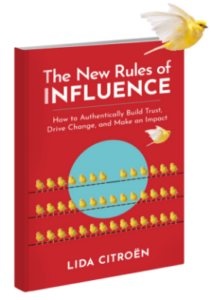The following is an excerpt from Lida Citroën’s best-selling book, “Reputation 360: Creating power through personal branding”. The book is an empowering and clear guide to understanding, developing and marketing your personal value and offer through online and in person positioning.

There are four Cs and an A to remember when building a successful personal brand. First, your brand  needs to be clear. It’s up to you to clearly articulate to others what makes you unique. If you don’t clearly communicate your value, you could fall victim to the commodity sale (described in the last chapter) or, worse yet, to a position of irrelevance. Let’s say that I’m considering two interior designers to work on my house, and they both have appropriate skills: They both belong to the right associations, and they both have the same number of years of experience. But one of them is known for being fun to work with and offers great suggestions. She makes me feel like she understands me; she knows my personality, and I won’t feel bad asking dumb questions. Also, she has flair and a style that I can relate to. All of a sudden, in my mind, she’s not measured side by side with that other interior designer. She has value and uniqueness: She’s branded, and she’s somebody I want to work with. I will even pay a little bit more for the opportunity to work with her.
needs to be clear. It’s up to you to clearly articulate to others what makes you unique. If you don’t clearly communicate your value, you could fall victim to the commodity sale (described in the last chapter) or, worse yet, to a position of irrelevance. Let’s say that I’m considering two interior designers to work on my house, and they both have appropriate skills: They both belong to the right associations, and they both have the same number of years of experience. But one of them is known for being fun to work with and offers great suggestions. She makes me feel like she understands me; she knows my personality, and I won’t feel bad asking dumb questions. Also, she has flair and a style that I can relate to. All of a sudden, in my mind, she’s not measured side by side with that other interior designer. She has value and uniqueness: She’s branded, and she’s somebody I want to work with. I will even pay a little bit more for the opportunity to work with her.
Studies show that people are willing to pay nine percent to twelve percent more for a brand that they perceive as different from the others, a brand they know and trust. It’s why many women walk into the laundry detergent aisle at the grocery store and buy Tide, because “Tide makes me feel like I’m a good mom.” “It makes me feel like I can take care of my family and I know my clothes will come out clean.” “Tide is special, and my family deserves it.”
At every step, we want to use words and marketing strategies that reflect our differentiation. What is your brand and how are you special? What are you passionate about? What makes you different from the person sitting next to you? You could be sitting next to someone with the same skill set, almost identical education and training, the same hair color and even the same set of contacts. What makes you different? You must clearly communicate, through everything you do, why you are the ideal choice and make yourself relevant to that target audience.
Second, what makes you compelling? Why should I (your target audience) care about this uniqueness? You (and your mother) might think you are the greatest asset any company could hope to employ. But personal branding is not all about you. It’s about the needs, interests and goals of the audience you are targeting. You need to make sure the message you deliver to that audience is compelling and clearly articulates why they should care. Think about my example of the two interior designers. The one I find compelling is the one who ensures that I (her target client) recognize the unique skills and traits she brings to the engagement. She makes sure that I see her flair (by how she dresses, her marketing materials and her language) and her outgoing personality and that I feel reassured as I ask questions during the interview. She makes sure I find her relevant.
Then, you need to demonstrate that you are credible. Credibility and integrity are not traits you can promote just by saying, “My personal brand is that of trust!” Credibility and integrity are intangible; they are experienced, proven, tested and consistent. They are the values our “fans” will refer to as they sing our praises, refer us to prospects and nominate us for recognition.
The only formula I know for building credibility within a personal brand is a pretty simple one. It starts with articulating your values: telling people what you stand for, what matters to you, what you will fight for. And it ends with being consistent (the fourth C!) with the values and beliefs you advocate. By doing so, you build a reputation of integrity. This is what we mean by “walking the talk.” My new interior designer will ensure that when I see her website, talk to her former clients, read her blog and begin working with her, the traits and values she conveyed in our first meeting are consistent across all her other points of marketing.
Here’s an example: Let’s say you are passionate about transparency. You believe people should see you for what you are. “What you see (with me) is what you get,” you say. It is vitally important to you that people learn to trust that you are a man of your word, that there are no “smoke and mirrors,” that you are what you say.
What happens if I go to your website and I see you representing yourself differently? Or if I see you interviewed at a company “town hall” meeting and you recite rehearsed words fed to you by your public relations team? Maybe I repeatedly overhear you speaking ill of another colleague or competitor. Is that the behavior of someone who is transparent? I don’t think so.
I need to know that if your values involve qualities such as being approachable, warm and inviting, then I can walk into your office if I need something and you’re not going to shut the door in my face. I need to know that if I leave you a message, you’re going to call me back. I need to know that if I have an issue I need to talk to you about, you’ll make time for me. Consistency is critical. Otherwise, I’ll see your values as just lip service, “spin” or “fluff.” When we talk about credibility and integrity, we’re talking about acting according to your values. It’s the walk-the-talk philosophy. Through repetitive consistency, I believe what you tell me and show me to be true. I begin to trust you.
If you develop a personal brand that is clear, compelling, credible and consistent, you will be rewarded with benefits, opportunities and the reputation you desire.
The A…. Authenticity is at the heart of your personal brand
The work that I do is all rooted in authenticity, that deep-down, quiet truism about you as a dynamic and special person that makes you unlike anyone else. It is your genuine spirit, the you that is the most real. To be in touch with your authenticity means you see yourself as a whole—the good and the bad, the successes and the failures—and you own it all. You have humility in knowing what your limitations are and where your passions stem from. To be living an authentic personal brand is to be the most empowered person you can possibly be. To be authentic is to live a life where you (the real you) are always present.
My work with executives, leaders, experts, professionals and even corporations always starts by understanding and then developing what makes them genuine. Authenticity is at the truest core of what we do in marketing our value to others.
To learn more about Reputation 360: Creating power through personal branding, please visit www.Reputation360Book.com.


